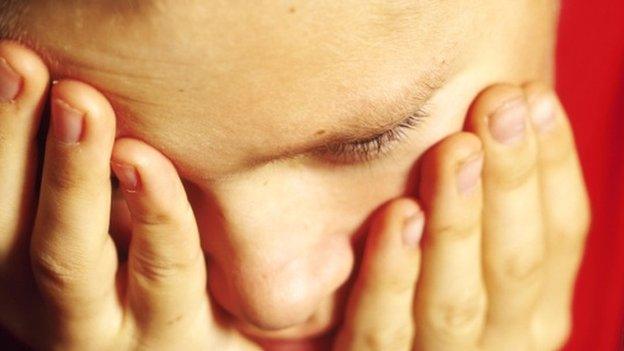Mental health help 'needed in schools'
- Published

Boredom can be a warning sign
A new website is being launched to help adults spot the warning signs of mental health problems in children.
In Scrubbing Up this week, child psychiatrist Dr Raphael Kelvin - who led the project - says if we're to really support children with mental health problems, we need to more aid - including in the classroom.
There are at least 850,000 children in the UK with a diagnosed mental health condition and the figure may well be rising.
Yet 75% do not receive the support they are entitled to and need. We are, albeit unwittingly, condemning thousands of the country's most vulnerable children to years of distress and lost opportunities. Why?
On the one hand, many mental health services for children and young people are underdeveloped and often underfunded.
But there's another key problem. Many healthcare professionals, teachers, police, volunteers and others who come into contact with them, do not know what a mental health condition looks like or how to approach the issue.
So what needs to be done?
'Missed opportunity'

People feel schools need to be able to offer help
There are an estimated 9.5m children in the education system, making schools a vital place to start.
When we polled the public on the issue, 69% said they supported the notion that every school should have a dedicated member of staff on site for children to approach about mental health and well-being issues.
Nearly two-thirds (63%) also felt it was important that every school has regular interaction with a specialist from mental healthcare services.
And perhaps most striking is that 37% would turn to a teacher for help and advice if they suspected a child had a mental health issue.
So we need to be supporting schools to be able to identify, refer and support those children who show signs of mental ill health and make sure they get the appropriate help quickly.
Without investment in school mental health provision, we're missing a real opportunity to have an impact.
Beyond the school gates, where else should these priorities lie?
This is complex topic and it includes further improvement and development of a range of important services.
Getting it right online has to be a key focus as that's where many people turn for information first.
Right path
The same poll highlighted that over a third of adults would not know how to spot a child with a potential mental health issue.
Many weren't aware that poor appetite and weight loss could be a symptom of depression, over half weren't sure if waking earlier than usual could be a sign of mental health problems - and excessive boredom and poor concentration can be causes for concern.
And when people don't know, one of the first places they look is the internet. In fact, nearly three quarters of adults polled say they'd use the internet for advice on child mental health issues.
There are a lot of good online resources offering advice and information and numerous discussion forums for sharing experience of mental ill health.
But with professionals and volunteers who come into contact with children identified as key in spotting the signs of mental problems (and as with physical illness, the earlier these conditions are identified, the better) - a targeted resource for them is needed.
MindEd, an online tool launching today, contains bite-size learning , individually tailored to equip any one of the one million professionals and volunteers working with children and young people - including teachers, sports coaches, police, healthcare professionals, social workers and many more - with the skills to support and identify children with mental health conditions.
It aims to speed up the time it takes to identify a child with a mental health problem and put them on the path to the most appropriate support and where necessary, the right treatment. It's free, available to everyone, and easy to use.
All too often I see children and young people who enter the health system when they've been struggling with a mental health problem for a long time.
Better support early on - including specific mental health leads in schools and tailored online support for professionals - could be key to catching issues early.
And in a world of squeezed budgets and resource pressure, we need to make sure resources are being directed in the right way; including into the classroom and onto the web.
- Published25 March 2014
- Published13 March 2014
- Published1 March 2014